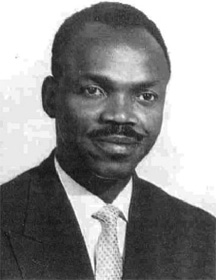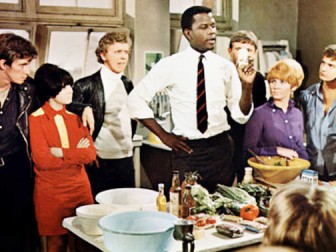In another ten days, on June 27, 2012, one of Guyana’s celebrated writers will be 100 years old. The novelist, scientist, author, diplomat and Literary Fellow known as ‘E R Braithwaite,’ was born Edward Ricardo Braithwaite in Guyana on June 27, 1912 and is now living in the USA. The National Library in Georgetown, Guyana has devoted the month of June to a celebration of him and launched this month of activities on June 1, last.
The library had already paid public attention to Braithwaite in recent times with a programme of critical presentations, readings and dramatisations during which a telephone call to him was beamed live to the audience. He was interviewed by playwright and TV documentalist Francis Quamina Farrier. That was a timely recognition and, as Alim Hosein pointed out in that programme, he has been accorded significant international recognition.
 The high regard in which he is held was most recently demonstrated by the following announcement by Manchester Community College in Connecticut, USA, on February 3, 2006: “Dr Edward R Braithwaite, author of To Sir With Love, has been named a Distinguished Visiting Professor at Manchester Community College during the Spring 2006 semester.” This appointment followed a public lecture delivered at the college by the author in February 2005, and his appointment meant he delivered a long series of lectures starting in February, 2006 when he was 93-years-old.
The high regard in which he is held was most recently demonstrated by the following announcement by Manchester Community College in Connecticut, USA, on February 3, 2006: “Dr Edward R Braithwaite, author of To Sir With Love, has been named a Distinguished Visiting Professor at Manchester Community College during the Spring 2006 semester.” This appointment followed a public lecture delivered at the college by the author in February 2005, and his appointment meant he delivered a long series of lectures starting in February, 2006 when he was 93-years-old.
National Library Chief Librarian Gillian Thompson is now leading a team at the Church Street institution to give this famous centenarian further public recognition in the land of his birth. This celebration and information about Braithwaite, are necessary to propagate awareness of his work and contribution since he rocketed to the heights of his fame some 45 years ago, but he has made a mark on the world and carried a flag for Guyana for several years.
His fame is accompanied by ironies and a series of interesting facts. His training and education were in science. He received a Bachelors Degree (1949) and a PhD in Physics from the University of Cambridge; he has been a diplomatic representative for Guyana, including an ambassadorial posting at the United Nations; he has written mathematical texts and works of socio-political significance; and until recently he was Writer in Residence at Howard University. He has been equally honoured by other universities, including honorary doctorates from Oxford and the University of Paris, Sorbonne. Yet, none of these accolades came out of his work in physics or science for which he was trained.

Dr Braithwaite owes his fame and later achievements to the writing and publication of a novel, To Sir With Love. And this novel arose out of his work as a secondary school teacher, which he did reluctantly, and which was never a major occupation of his. Also, in terms of Guyanese literature, Braithwaite has always been a minor Guyanese novelist. He was never among the major writers nor received the critical acclaim that would have placed him there. And this is in spite of the fact that he started writing and produced his best-selling book at the time (1959) when most of the leading West Indian writers were launching their careers in London. Those were the writers in the nineteen fifties and sixties who made West Indian literature.
Where Guyanese writers published in the metropolis within that same context are concerned, Braithwaite was preceded only by Edgar Mittelholzer, Martin Carter and Beryl Gilroy. Within that small group only Mittelholzer and Gilroy were among the pioneers in London. Even Wilson Harris joined that group later and published his first novel in England in 1960.
Braithwaite’s fame was based on the fact that To Sir With Love was made into a very successful and popular movie with top flight actor Sidney Poitier and a chart-topping theme song by Lulu. It was this that brought the writer to the world’s attention and caused the BBC and a wider audience to take an interest in his other novels and publications. This chain of accolades and recognition led to him being demanded by universities, caused him to be honoured with doctorates, and placed him as ambassadorial representative for his native country.
Yet, his achievements go deeper because of the cause and subjects of his writings and their contribution to issues of race, and the creation of a wider international audience that was prepared to listen to him.
The background to the famous novel is well known. Despite the highest level of his qualifications in Physics he was unable to land a job in Britain. That was, to make things worse, in spite of his service to the United Kingdom as a pilot in the Royal Air Force during World War II. He served for six years. He took a job as a teacher at a London East End school notorious for poor performance and misbehaviour in a depressed inner city environment. He went reluctantly into what was considered a graveyard for teachers and was able to reform wayward teenagers and win the respect of the cynical.
He decided to write to exorcise his reaction to racial discrimination and instruct a readership through his experiences. This also led him into another service as a social worker during which he also championed the cause of not only blacks, but also white Londoners in depraved conditions. His second novel Paid Servant (1962) came out of this experience with the London County Council. He internationalised his concerns on the subject of race by writing about the apartheid conditions in South Africa which led to the banning of his publications in that country. However, his status and acclamation influenced the South African government to lift the ban and he visited the country in 1973, enjoying the official hospitality of the state. Ironically, this gave him further material for another critical book on apartheid called Honorary White (1975).

These books and the film, as well as the additional publicity Braithwaite received from the BBC, allowed him to raise the consciousness of a much wider audience and lent him much greater international exposure than would have been received by the major novelists.
His achievements also led him into another occupation that he never intended, but which he moved into almost inevitably. According to information supplied by the National Library (Guyana), Braithwaite had a series of important appointments arising from his experiences and publications. He was Human Rights Officer for World Veterans Foundation in Paris (1960-63); and Lecturer and Education Officer with UNESCO (1963-66). His exploits in the service of his nation also brought him further notice. He was the first Guyanese to hold the post of Ambassador to the United Nations in 1967 which led to his election as President of the UN Council for South West Africa in 1968.
The library’s information advises on Braithwaite’s career within universities and colleges which followed after. This includes appointments as Professor of English and Writer in Residence at New York University in 2002 and similar positions at Florida State University and Howard. Some of these appointments are dated after the year 2000 which show how active he has been in his later years.
On June 27 it will be a busy, well-earned 100th birthday.




